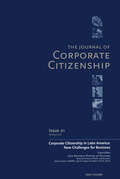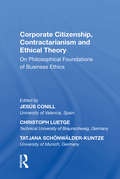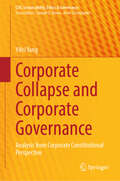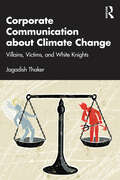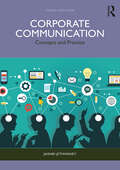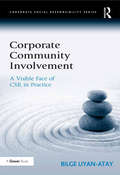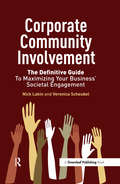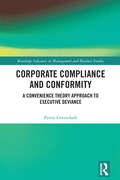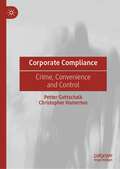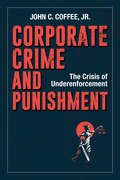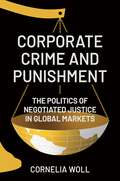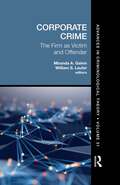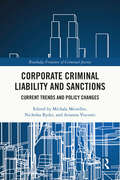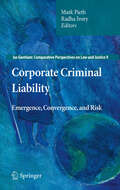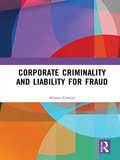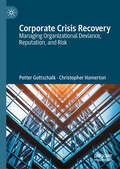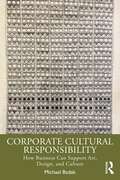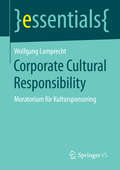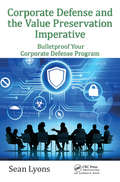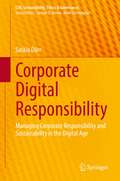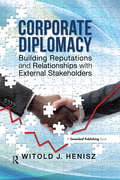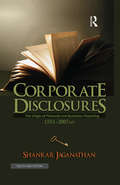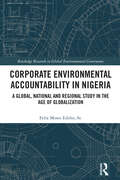- Table View
- List View
Corporate Citizenship in Latin America: A special theme issue of The Journal of Corporate Citizenship (Issue 21)
by Jose Antonio Puppim De OliveiraCorporate citizenship and corporate social responsibility have become hot topics of debate for business, academia and organised civil society in Latin America. However, although there is a lot of material in Spanish and Portuguese, there are few publications available in English. This special issue of JCC opens the discussion in English across different countries in the region.
Corporate Citizenship, Contractarianism and Ethical Theory: On Philosophical Foundations of Business Ethics (Law, Ethics And Economics Ser.)
by Reinhard Mohn Jesús Conill Tatjana Schonwalder-KuntzeThis study provides a representation of the broad spectrum of theoretical work on topics related to business ethics, with a particular focus on corporate citizenship. It considers relations of business and society alongside social responsibility and moves on to examine the historical and systemic foundations of business ethics, focusing on the concepts of social and ethical responsibilities. The contributors explore established theories and concepts and their impact on moral behaviour. Together, the contributions offer varied philosophical theories in approaches to business ethics. The book will be a valuable resource for academics and researchers with an interest in the theoretical development of business ethics.
Corporate Collapse and Corporate Governance: Analysis from Corporate Constitutional Perspective (CSR, Sustainability, Ethics & Governance)
by Yifei YangThis book provides an in-depth examination of the relationship between the UK&’s dominant corporate governance regime and major corporate failures, with a particular focus on the collapse of Carillion Plc. Through a detailed analysis of the Carillion case and its aftermath, the book highlights a persistent issue in the market&’s failure to learn from past collapses, allowing similar failures to recur. The exploration of corporate constitutional analysis into Carillion is presented as a thought experiment, aiming to discover new perspectives on these systemic breakdowns. It investigates whether adopting a corporate constitutional paradigm might offer fresh insights and support meaningful reform of the UK&’s contractualist, shareholder-focused model. The book identifies the dysfunction at the heart of the current framework as a direct cause of corporate collapse and demonstrates how different governance paradigms can shape distinct corporate behaviours and outcomes. It calls for a fundamental rethinking of how corporate power is structured and justified. By critically evaluating the internal and external dimensions of corporate governance, this book provides a timely and thought-provoking contribution for scholars, policymakers, and practitioners seeking more resilient and responsible models of governance.
Corporate Communication about Climate Change: Villains, Victims, and White Knights
by Jagadish ThakerEmbedded in the emerging field of climate change communication, Thaker provides a comprehensive analysis of enablers and barriers to corporate action on climate change, business role and influence on media coverage of climate change, and its impact on public opinion and the policy-making process.Focusing on extensive academic research, business reports, case studies, and best practices from around the world, this book offers a practical guide to effective strategies in corporate climate change communication, including leadership communication, rebuilding public trust amidst greenwashing scandals, and engaging stakeholders with business action on climate change. The book provides new directions on the role of social media influencers, artificial intelligence, and big data in enhancing transparency in business actions and effective communication with key stakeholders.This book is an essential read for students, scholars, and professionals interested in the emerging fields of climate change communication, strategic communication, and related areas of sustainability and Environmental, Social, and Corporate Governance (ESG) communication.
Corporate Communication: Concepts and Practice
by Jaishri JethwaneyCorporate Communication: Concepts and Practice—a comprehensive and engaging textbook—helps in understanding the underlying concepts and real-life strategies of communication in modern-day corporate set-ups. One of the youngest management disciplines, corporate communication is used by companies to position themselves to the outside world in a highly competitive business environment and to build a “sense of being,” on the one hand, and creating a feeling of pride in being associated with the company for various stakeholders, especially the employees and investors. Some of the functions of corporate communication include identifying and segmenting stakeholders, articulating brand positioning, selecting appropriate channels of internal and external communication, and managing crises, conflicts, and reputations, among others. This revised edition offers a fresh perspective into all basic and critical aspects of corporate communication and incorporates the latest changes in governmental policies and industry trends to aid students adapt to the contemporary business environment and become industry-ready. This book will be of great interest to students and researchers working in the areas of corporate communication, organizational communication, journalism, mass communication, communication studies, public relations, and human resource management.
Corporate Community Involvement: A Visible Face of CSR in Practice (Corporate Social Responsibility)
by Bilge Uyan-AtayThere has been tremendous growth in Corporate Community Involvement (CCI) projects of all sizes in recent years. This has been encouraged by organisations such as Business in the Community in the UK, which provides information designed to motivate businesses and government to engage in CCI. In fact, the projects incorporated into some companies’ strategy implementation are now so extensive that they are having a profound impact on community development. Corporate Community Involvement examines CCI as a distinct type of corporate social responsibility and the nature of the relationship between business and society. Bilge Uyan-Atay considers that CCI has been poorly described and researched, concentrating mainly on Western Europe and the USA, failing to consider different institutional contexts and to make the best use of available theory to uncover a more holistic perspective. The author’s native Turkey is a secular, developing country with a growing economy. This provides a distinctive environment in which to study CCI. The author explores and analyses economic, strategic, cultural and institutional influences on CCI and its relationships to and differences from corporate social responsibility.
Corporate Community Involvement: The Definitive Guide to Maximizing Your Business' Societal Engagement
by Nick Lakin Veronica Scheubel"We need to do Community Involvement better – we know we're spending millions each year on charitable causes; how can we find out what is really effective and what people will appreciate us for? Who should we partner with? How can we make a real difference in society and help our business?" Companies around the world are trying to answer these questions. Many are asking the same questions even as, collectively, they continue to spend billions on their communities. How do they know which activities are really worthwhile? Building on the authors' own extensive global experience at Nokia and E.ON, as well as the experience of many other experts in the field, this book offers the first-ever "how to" roadmap for managers on the comprehensive implementation of strategic Community Involvement inside their companies. It is designed to be practical, for those who want to act upon what they have read. It will fill a long-neglected niche as a day-to-day reference guide for practitioners. Corporate Community Involvement demonstrates what to do and how to do it. The advice is backed up by inspiring interviews with best-in-class practitioners from businesses such as Microsoft, GlaxoSmithKline, Ericsson, and Deutsche Bank and leading international Corporate Responsibility and Community Involvement experts. The book highlights proven best-practice approaches, effective methods, and concise tools to help managers "get there faster" and "get it right first time." The core of the book is a step-by-step guide to developing and implementing a comprehensive and successful approach to Corporate Community Involvement. It shows how to: conduct a current state analysis and devise a strategy, organize staffing and budgets, integrate Corporate Community Involvement throughout the business and create high-profile programs, partner across sectors, measure and evaluate results, communicate successful activities, and overcome challenges. Corporate Community Involvement has an international perspective: the models and principles advocated are adaptable anywhere in the world. Also, it is designed to have as much relevance to a small or medium-sized enterprise as to a multinational. The book outlines the history and future of Corporate Community Involvement, explaining the business context and why companies need to manage their programs strategically. It also distinguishes between the growing lexicon of terminologies and provides clear definitions of terms such as "philanthropy", "sponsorship", "Corporate Citizenship", "Corporate Responsibility" and "Sustainability", advising when they are appropriate and how each can add value to corporate activities. This will be an indispensible resource for those working at the interface between business and the community. New or developing practitioners will learn from both the successes and failures of those before them. Representatives from other sectors, notably government, international agencies, NGOs, and academia, will come to understand companies' internal requirements for cross-sector collaboration programs in the community better. And students interested in this field will be better equipped to start careers.
Corporate Compliance and Conformity: A Convenience Theory Approach to Executive Deviance (Routledge Advances in Management and Business Studies)
by Petter GottschalkTraditionally, control in organizations is concerned with top-down approaches, where executives attempt to direct their employees’ attention, behaviors, and performance to align with the organization’s goals and objectives. This book takes a new approach by turning the problem of control upside down as it focuses on control of executives who find white-collar crime convenient. The bottom-up approach to executive compliance focuses on organizational measures to make white-collar crime less convenient for potential offenders. Rather than focusing on the regulatory formalities and staged procedures of compliance and audits, the book emphasizes the organizational challenges involved in compliance work when trusted corporate officials exhibit deviant behavior, refining, and advancing knowledge in this field by reference to contemporary international case studies and associated original evaluative research. The themes and cases covered are carefully selected to provide the reader with an insight into professional conduct and procedural practice – the organization of corporate compliance success, failure, and corruption – with the theory of convenience placed at the fore. It is the bottom-up approach by application of convenience theory that makes the proposed book unique compared to other books on corporate compliance. This book is a valuable resource for scholars and upper-level students researching and studying in the areas of business administration, organizational behavior, corporate and white-collar crime, as well as business ethics and auditing.
Corporate Compliance: Crime, Convenience and Control
by Petter Gottschalk Christopher HamertonCompliance has long been identified by scholars of white-collar crime as a key strategic control device in the regulation of corporations and complex organisations. Nevertheless, this essential process has been largely ignored within criminology as a specific subject for close scrutiny – Corporate Compliance: Crime, Convenience and Control seeks to address this anomaly. This initiating book applies the theory of convenience to provide criminological insight into the enduring self-regulatory phenomenon of corporate compliance. Convenience theory suggests that compliance is challenged when the corporation has a strong financial motive for illegitimate profits, ample organisational opportunities to commit and conceal wrongdoing, and executive willingness for deviant behaviour. Focusing on white-collar deviance and crime within corporations, the book argues that lack of compliance is recurrently a matter of deviant behaviour by senior executives within organisations who abuse their privileged positions to commission, commit and conceal financial crime.
Corporate Crime and Punishment: The Crisis of Underenforcement
by John C. Coffee Jr."Professor Coffee's compelling new approach to holding fraudsters to account is indispensable reading for any lawmaker serious about deterring corporate crime."—Robert Jackson, former Commissioner, Securities and Exchange Commission In the early 2000s, federal enforcement efforts sent white collar criminals at Enron and WorldCom to prison. But since the 2008 financial collapse, this famously hasn't happened. Corporations have been permitted to enter into deferred prosecution agreements and avoid criminal convictions, in part due to a mistaken assumption that leniency would encourage cooperation and because enforcement agencies don't have the funding or staff to pursue lengthy prosecutions, says distinguished Columbia Law Professor John C. Coffee. "We are moving from a system of justice for organizational crime that mixed carrots and sticks to one that is all carrots and no sticks," he says. He offers a series of bold proposals for ensuring that corporate malfeasance can once again be punished. For example, he describes incentives that could be offered to both corporate executives to turn in their corporations and to corporations to turn in their executives, allowing prosecutors to play them off against each other. Whistleblowers should be offered cash bounties to come forward because, Coffee writes, "it is easier and cheaper to buy information than seek to discover it in adversarial proceedings." All federal enforcement agencies should be able to hire outside counsel on a contingency fee basis, which would cost the public nothing and provide access to discovery and litigation expertise the agencies don't have. Through these and other equally controversial ideas, Coffee intends to rebalance the scales of justice.
Corporate Crime and Punishment: The Politics of Negotiated Justice in Global Markets
by Cornelia WollThe geopolitics of American law enforcement and how it changed corporate criminal accountability in other countriesOver the past decade, many of the world’s biggest companies have found themselves embroiled in legal disputes over corruption, fraud, environmental damage, tax evasion, or sanction violations. Corporations including Volkswagen, BP, and Credit Suisse have paid record-breaking fines. Many critics of globalization and corporate impunity cheer this turn toward accountability. Others, however, question American dominance in legal battles that seem to impose domestic legal norms beyond national boundaries. In this book, Cornelia Woll examines the politics of American corporate criminal law’s extraterritorial reach. As governments abroad seek to respond to US law enforcement actions against their companies, they turn to flexible legal instruments that allow prosecutors to settle a case rather than bring it to court. With her analysis of the international and domestic politics of law enforcement targeting big business, Woll traces the rise of what she calls “negotiated corporate justice” in global markets.Woll charts the path to this shift through case studies of geopolitical tensions and accusations of “economic lawfare,” pitting the United States against the European Union, China, and Japan. She then examines the reactions to the new legal landscape, describing institutional changes in the common law countries of the United Kingdom and Canada and the civil law countries of France, Brazil, and Germany. Through an insightful interdisciplinary analysis of how the prosecution of corporate crime has evolved in the twenty-first century, Woll demonstrates the profound transformation of the relationship between states and private actors in world markets, showing that law is part of economic statecraft in the connected global economy.
Corporate Crime: The Firm as Victim and Offender (Advances in Criminological Theory)
by William S. Laufer Miranda A. GalvinThis volume speaks to the fundamental issues inherent in trying to understand the who-what-where-and-whys of corporate crime. Only in addressing these larger issues does it become possible to begin to integrate the study of corporate crime into the larger criminological theory literature. A collection of chapters by experts in the field grapples with three deceptively simple questions: When are firms morally and legally responsible agents? What are the harms of corporate wrongdoing and who are the victims? What theories offer insight to explain corporate wrongdoing? In the first section, chapter authors wrestle with what it means for a corporation to have agency enough to commit a violation of law as well as what philosophies of punishment might apply when there is no body to jail. The second section focuses attention on the often unnamed, ambiguous, or even ignored victims of corporate crime. Many authors in this section take a broad view of “victimization,” speaking to the ways in which the intentional acts of corporations produce negative consequences for individuals and society at large through both the violation of law and the use of corporate power to produce laws that do not problematize corporate behavior. The third section turns to issues in corporate offending research, including the circumstances that beget offending, how corporations may be thought to have “life courses,” and the role of the State in structuring criminal opportunity. The editors wrap up the volume by proposing a framework for developing a more comprehensive system of criminal responsibility for corporate actors.The chapters in this volume underscore the failures of the current system and are intended to inspire readers to push for change. This important work will be of interest to a wide range of criminologists and has potential to shape the future of corporate crime theory and research. It is ideal for use in graduate seminars and upper-level undergraduate courses.
Corporate Criminal Liability and Sanctions: Current Trends and Policy Changes (Routledge Frontiers of Criminal Justice)
by Nicholas Ryder Michala Meiselles Arianna ViscontiThis edited collection sheds light on the evolution of corporate financial crime, exploring a myriad of offenses ranging from money laundering and fraud to market manipulation and bribery.Considering and assessing the models used in national law to determine the culpability of corporations, this book compares the different schemes used to address financial and other organisational crimes committed by these entities. Through a combination of history, law, and global perspectives, its chapters dissect landmark cases and provide detailed analyses of money laundering, fraud, market manipulation, manslaughter, and legislative responses in various locations around the world. This comparative approach offers a unique lens, exploring diverse jurisdictions and shedding light on global patterns of corporate wrongdoing. By critically assessing the challenges of prosecuting economic crimes on a large scale, the collection proposes innovative solutions, including the introduction of ‘failure to prevent’ offences.Corporate Criminal Liability and Sanctions: Current Trends and Policy Changes is a valuable resource for academics, professionals, and anyone intrigued by the ever-evolving realm of white-collar and corporate wrongdoing. It will appeal to scholars across the fields of law, criminology, sociology, and economics, as well as those professionally engaged in preventing and investigating corruption and in developing or enforcing regulation, such as solicitors, barristers, businessmen, and public servants.
Corporate Criminal Liability: Emergence, Convergence, and Risk (Ius Gentium: Comparative Perspectives on Law and Justice #9)
by Mark Pieth Radha IvoryWith industrialization and globalization, corporations acquired the capacity to influence social life for good or for ill. Yet, corporations are not traditional objects of criminal law. Justified by notions of personal moral guilt, criminal norms have been judged inapplicable to fictional persons, who 'think' and 'act' through human beings. The expansion of new corporate criminal liability (CCL) laws since the mid-1990s challenges this assumption. Our volume surveys current practice on CCL in 15 civil and common law jurisdictions, exploring the legal conditions for liability, the principles and options for sanctioning, and the procedures for investigating, charging and trying corporate offenders. It considers whether municipal CCL laws are converging around the notion of 'corporate culture', and, in any case, the implications of CCL for those charged with keeping corporations, and other legal entities, out of trouble.
Corporate Criminality and Liability for Fraud
by Alison CroninThrough a rational reconstruction of orthodox legal principles, and reference to cutting-edge neuro-science, this book reveals some startling truths about the criminal law, its history and the fundamental doctrines that underpin the attribution of criminal fault. While this has important implications for the criminal law generally, the focus of this work is the development of a theory of corporate criminality that accords with modern theory of group agency, itself informed by advancements in contemporary philosophy and social science. The innovation it proposes is the theoretical and practical means by which criminal fault can be attributed directly to the corporate actor, where liability cannot or should not be reduced to its individual members.
Corporate Crisis Recovery: Managing Organizational Deviance, Reputation, and Risk
by Petter Gottschalk Christopher HamertonThe principal aim of Corporate Crisis Recovery: Managing Organizational Deviance, Reputation, and Risk is to complement and expand criminological discourse on the concept of the social license to operate as a means of influencing the behaviour of corporations. In recent years, the wide-spanning consequences of some very public globalized corporate crises – including fiscal and environmental impact, staff retention, and organizational survival – have led to a growing body of research on crisis perception and responsive strategic management. Developments that position corporate crisis recovery as an anticipated requirement of visible compliance to normalized and anticipated standards of ethical practice and business conduct. Utilizing convenience theory to illustrate how corporations, and the individuals therein, are able to lose, repair, and recover the corporate license to operate after corruption and scandal, the book develops to evaluate the responses of the public and criminal justice process to serious reputational damage and substantial breach of trust.
Corporate Crops: Biotechnology, Agriculture, and the Struggle for Control
by Gabriela PechlanerBiotechnology crop production area increased from 1. 7 million hectares to 148 million hectares worldwide between 1996 to 2010. While genetically modified food is a contentious issue, the debates are usually limited to health and environmental concerns, ignoring the broader questions of social control that arise when food production methods become corporate-owned intellectual property. Drawing on legal documents and dozens of interviews with farmers and other stakeholders, Corporate Crops covers four case studies based around litigation between biotechnology corporations and farmers. Pechlaner investigates the extent to which the proprietary aspects of biotechnologies-from patents on seeds to a plethora of new rules and contractual obligations associated with the technologies-are reorganizing crop production. The lawsuits include patent infringement litigation launched by Monsanto against a Saskatchewan canola farmer who, in turn, claimed his crops had been involuntarily contaminated by the company's GM technology; a class action application by two Saskatchewan organic canola farmers launched against Monsanto and Aventis (later Bayer) for the loss of their organic market due to contamination with GMOs; and two cases in Mississippi in which Monsanto sued farmers for saving seeds containing its patented GM technology. Pechlaner argues that well-funded corporate lawyers have a decided advantage over independent farmers in the courts and in creating new forms of power and control in agricultural production. Corporate Crops demonstrates the effects of this intersection between the courts and the fields where profits, not just a food supply, are reaped.
Corporate Cultural Responsibility: How Business Can Support Art, Design, and Culture
by Michael BzdakIs corporate investing in the arts and culture within communities good business? Written by an expert on the topic who ran the Corporate Art Program at Johnson & Johnson, the book sets out the case for business patronage of the arts and culture and demonstrates how to build an effective program for businesses to follow. As companies seek new ways to add value to society, this book places business support of the arts in a corporate social responsibility context and offers a new concept: Corporate Cultural Responsibility. It discusses the issues underlying business support of the arts and explores new avenues of collaboration and value creation. The framework presented in the book serves as a guide for identifying the key attributes and projected impact of successful and sustainable models. Unlike other books centered on the relationship of art and commerce, this book looks at the broader and global implications of Corporate Cultural Responsibility. It also usefully sets the discussion about the role of philanthropy and corporate social responsibility and the arts within an historical timeframe. As the first book to link culture to community responsibility, the book will be of particular relevance to corporate art advisors and auction houses, as well as students of arts management and corporate social responsibility at advanced undergraduate and postgraduate levels.
Corporate Cultural Responsibility: Moratorium für Kultursponsoring (essentials)
by Wolfgang LamprechtDie globalen Krisen seit dem Jahr 2008 haben eines sehr deutlich werden lassen: Das Vertrauen der Menschen in Wirtschaft und Politik ist signifikant gesunken. Die Wiedererlangung von Vertrauen gilt daher als oberste Prämisse für ein sozial ausgeglichenes Gesellschaftssystem und für nachhaltige Stabilität. Damit steht Unternehmenskommunikation vor einer strategischen Herausforderung: Reputation und Image müssen möglichst mit nachweisbaren Return wiederhergestellt werden. Zwar gilt die Übernahme gesellschaftlicher Verantwortung - Glaubwürdigkeit vorausgesetzt - als konstituierender Faktor für Vertrauen und Erfolgskontrolle, Kultur scheint dabei aber eine untergeordnete Rolle zu spielen. Corporate Citizenship ist das diskutierte Modell der Stunde und Corporate Social Responsibility ein wiederentdecktes Konzept: Innerhalb dessen muss sich nun eine Corporate Cultural Responsibility (CCR) als dramaturgischer Handlungsstrang zum Nutzen des Unternehmens beweisen. Wolfgang Lamprecht bietet eine Einführung in das Thema CCR.
Corporate Defense and the Value Preservation Imperative: Bulletproof Your Corporate Defense Program (Security, Audit and Leadership Series #8)
by Sean LyonsThis is the first book to finally address the umbrella term corporate defense, and to explain how an integrated corporate defense program can help an organization address both value creation and preservation. The book explores the value preservation imperative, which represents an organization’s obligation to implement a comprehensive corporate defense program in order to deliver long-term sustainable value to its stakeholders. For the first time the reader is provided with a complete picture of how corporate defense operates all the way from the boardroom to the front-lines, and vice versa. It provides comprehensive guidance on how to implement a robust corporate defense program by addressing this challenge from strategic, tactical, and operational perspectives. This arrangement provides readers with a holistic view of corporate defense and incorporates the management of the eight critical corporate defense components. It includes how an organization needs to integrate its governance, risk, compliance, intelligence, security, resilience, controls and assurance activities within its corporate defense program. The book addresses the corporate defense requirement from various perspectives and helps readers to understand the critical interconnections and inter-dependencies which exist at strategic, tactical, and operational levels. It facilitates the reader in comprehending the importance of appropriately prioritizing corporate defense at a strategic level, while also educating the reader in the importance of managing corporate defense at a tactical level, and executing corporate defense activities at an operational level. Finally the book looks at the business case for implementing a robust corporate defense program and the value proposition of introducing a truly world class approach to addressing the value preservation imperative. Cut and paste this link (https://m.youtube.com/watch?v=u5R_eOPNHbI) to learn more about a corporate defense program and how the book will help you implement one in your organization.
Corporate Digital Responsibility: Managing Corporate Responsibility and Sustainability in the Digital Age (CSR, Sustainability, Ethics & Governance)
by Saskia DörrThis book describes in detail how corporate responsibility is changing in the age of big data and artificial intelligence and demonstrates how corporate digital responsibility can offer companies a sustainable competitive advantage. Business leaders and managers find a comprehensive guideline to professionally implement these innovative aspects in practice. It enables them to shape their businesses' success in a societally responsible and ethical manner in the context of digital transformation. As an essential guide, it invites executives, corporate responsibility officers, digital ethics experts, sustainability consultants, and anyone interested to learn about the opportunities of responsible digitalization at companies. In addition, the book offers a well-structured introduction to the still young field of corporate management and governance.
Corporate Diplomacy: Building Reputations and Relationships with External Stakeholders
by Witold J. HeniszManagers of multinational organizations are struggling to win the strategic competition for the hearts and minds of external stakeholders. These stakeholders differ fundamentally in their worldview, their understanding of the market economy and their aspirations and fears for the future. Their collective opinions of managers and corporations will shape the competitive landscape of the global economy and have serious consequences for businesses that fail to meet their expectations. This important new book argues that the strategic management of relationships with external stakeholders – what the author calls "Corporate Diplomacy" – is not just canny PR, but creates real and lasting business value.Using a mix of colourful examples, practically relevant tools and considered perspectives, the book hones in on a fundamental challenge that managers of multinational corporations face as they strive to compete in the 21st century. As falling communication costs shrink, the distance between external stakeholders and shareholder value is increasingly created and protected through a strategic integration of the external stakeholder facing functions. These include government affairs, stakeholder relations, sustainability, enterprise risk management, community relations and corporate communications. Through such integration, the place where business, politics and society intersect need not be a source of nasty surprises or unexpected expenses. Most of the firms profiled in the book are now at the frontier of corporate diplomacy. But they didn’t start there. Many of them were motivated by past failings. They fell into conflicts with critical stakeholders – politicians, communities, NGO staffers, or activists – and they suffered. They experienced delays or disruptions to their operations, higher costs, angry customers, or thwarted attempts at expansion. Eventually, the managers of these companies developed smarter strategies for stakeholder engagement. They became corporate diplomats. The book draws on their experiences to take the reader to the forefront of stakeholder engagement and to highlight the six elements of corprate diplomacy.
Corporate Disclosures: The Origin of Financial and Business Reporting 1553 - 2007 AD
by Shankar JaganathanSpanning over two millennia of time and five continents of space, this book narrates the unfolding of financial and business reporting. The first part of the book traces the origin of the 'company' as a form of organization and the evolution of bookkeeping. The second part: The Accounting Edifice, depicts events that led to the disclosure of the balance sheet, the profit and loss account, cash flow statements and the practice of auditing. In the third part: Reaching out to the Shareholders, the author explores the need for governance, reporting of intangible assets and the emergence of annual reports. Indian Corporate Disclosures, the fourth and the last part, sketches the panorama of post-independent dvelopments in Indian corporate disclosures using heritage IT companies, Wipro and Infosys as examples. The last chapter of the book contrasts disclosures by the Indian Sensex companies in 2007 with the best global practices.
Corporate Duties to the Public
by Barnali Choudhury Martin PetrinIn a world where the grocery store may be more powerful than the government and corporations are the governors rather than the governed, the notion of corporations being only private actors is slowly evaporating. Gone is the view that corporations can focus exclusively on maximizing shareholder wealth. Instead, the idea that corporations owe duties to the public is capturing the attention of not only citizens and legislators, but corporations themselves. This book explores the deepening connections between corporations and the public. It explores timely - and often controversial - public issues with which corporations must grapple including the corporate purpose, civil and criminal liability, taxation, human rights, the environment and corruption. Offering readers an encompassing, balanced, and systematic understanding of the most pertinent duties corporations should bear, how they work, whether they are justified, and how they should be designed in the future, this book clarifies corporations' roles vis-à-vis the public.
Corporate Environmental Accountability in Nigeria: A Global, National and Regional Study in the Age of Globalization (Routledge Research in Global Environmental Governance)
by Felix Moses EdohoThis book examines the imperative role of global environmental governance, and the need to incorporate corporate environmental accountability and mechanisms for enforcement, to effectively address the global environmental crisis.The author, Felix Moses Edoho, Sr., examines the issues at the various global, national, and regional levels. In Part I the book examines the issues at the global level and looks at the impact of transnational corporations (TNCs) and globalization on the global environmental crisis. Furthermore, it also examines the efforts of the United Nations in initiating global environmental architecture to tackle the crisis. Part II considers the issues at the national level and focuses on Nigeria. The author explores Nigeria’s regulatory and institutional framework for environmental governance and implementation. Lastly, at the regional level in Part III, the discourse centers on how decades of oil exploration and production have unleashed monumental ecological tragedies in the Niger Delta region of Nigeria due to the lack of corporate environmental accountability.This book will be of great interest to academics and students who are interested in broadening their knowledge of environmental governance and policy in developing countries. It will also be of value to environmental regulatory agencies and public administrators, development professionals, and TNCs.
